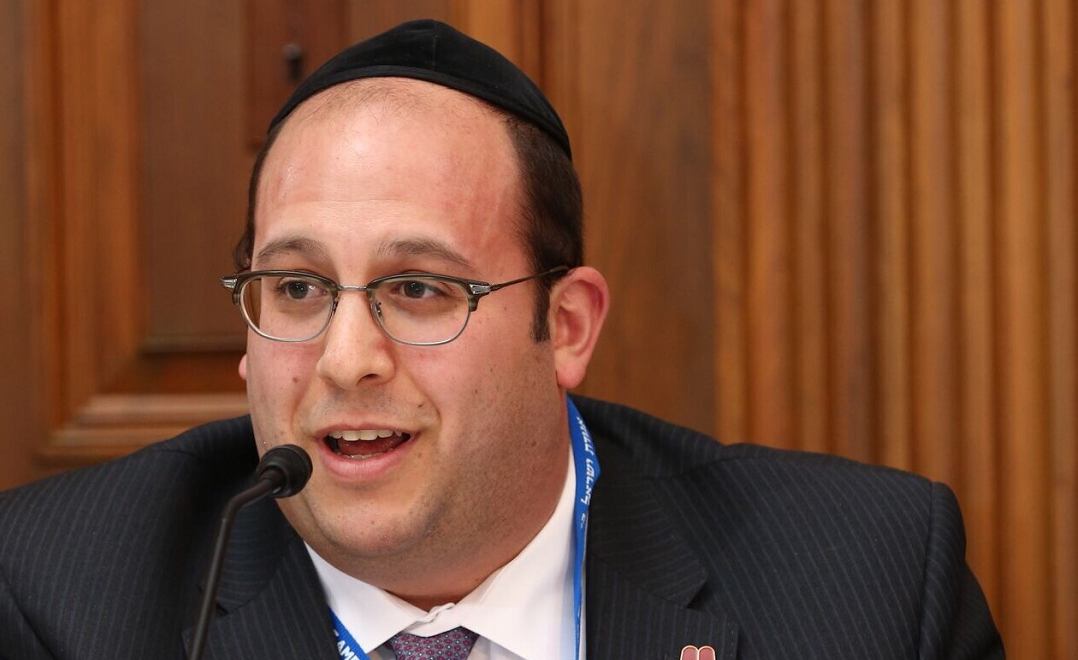Postville’s Crumbling Paradise

The story of Postville is more than the story of a plant closing in a small town. It is the story of an entire town united in prayer, waiting and hoping that the homes and businesses they’ve struggled to create will survive.

I
n 1987, Postville, Iowa, was a dying town.
The hospital had boarded up its windows. Local businesses were folding, crumpling before the onslaught of Wal-Mart and other national chains. Small farmers were being swallowed by agricultural conglomerates. The young people who had gone away for an education didn’t come back; there was nothing to come back to. The old slaughterhouse that had once been operated by Hygrade lay abandoned for twenty years, rotting and infested with rodents.
Into this blighted picture walked Aaron Rubashkin, a Russian-born butcher from Brooklyn with a good eye for a business opportunity. A group of local bankers and businessmen offered him startup money to help reopen the old Hygrade plant and establish his kosher meat packing business just outside the city limit. Both the Rubashkin family and the locals were enthusiastic, and a pioneering group of Lubavitcher Hasidim staked a claim in this tiny town that calls itself “Hometown to the World.”
Within ten years, the plant had grown exponentially, becoming the largest kosher meat packing plant in the world. The Rubashkins applied modern mass-production methods to kosher shechita, processing close to two million pounds weekly of beef, chicken, lamb and turkey. Now renamed Agriprocessors, the plant dominated America’s kosher meat market, capturing 60 of the market for beef and 40 for chicken. Their customer list, which included Muslims and health-conscious non-Jews, topped 11 million customers with sales of 10.5 billion dollars annually.
Agriprocessors gave a new meaning to the slogan “Hometown to the World” by bringing in a whole new population to Postville. The newcomers consisted of Chassidic shochtim, mashgichim and their families, as well as immigrant populations of Eastern European, Guatemalan, and Mexican workers. Languishing Postville businesses perked up, as Jewish and Hispanic families began to buy shoes and groceries and bring in their dry cleaning. Over time, a Jewish community developed that boasted a shul, a mikvah, a yeshiva, a Jewish library, a kosher grocery.
But today Postville is in danger of dying again. On May 12, 2008, federal agents from Immigration and Customs Enforcement swooped down in a massive surprise raid on the Agriprocessors plant. Charging Agriprocessors with hiring illegal and underage workers, they arrested 398 people and forced production to a halt.
A few days later 297 of the arrested workers, mostly Guatemalans and Mexicans, pleaded guilty to immigration violations and were either deported or imprisoned. “It was as if 390 people had just died,” Sister Mary McCauley of the local Saint Bridget’s Church told Mishpacha. “We all had to deal with the shock, and then with people’s immediate needs. We were serving between 200 and 300 meals every night.” In cases where both parents were arrested, the mothers were grudgingly allowed to stay. “I have a few female tenants wearing ankle bracelets to track their movements,” says local businessman Trevor Seibert.
In the weeks prior, the Iowa Division of Labor Services had not been idle either. They were following up on an affidavit filed in a nearby Iowa federal district court which accused the company of cheating workers out of fair wages, using abusive supervisors, and hiring underage workers as young as 13. There were also accusations of laxity on health and safety regulations. “Many people suspect a certain anti-Semitism in these raids,” says Rashi Raices, the principal of Postville’s Bais Chaya Mushka. “There are other companies with even greater violations that weren’t subjected to this kind of scrutiny.”
Nobody knows who blew the whistle on Agriprocessors, but in the months that followed, the Rubashkin family began a best-faith effort to do everything in their power to correct any problems that may have existed. They hired a new head of safety, Trent Gordon, a former Lockheed Martin operations manager, and gave him wide berth to make changes. They replaced Shalom Rubashkin with a new CEO, Bernard Feldman. They became scrupulous not to hire illegal aliens—although most of the illegals they had previously hired had presented with fake papers that misrepresented not only their status but their ages (many of them were desperate to pay back the $7,000-a-head fees owed to the “coyotes” who brought them across the border).
Things then went from bad to worse. Shalom Rubashkin, the son of Aaron Rubashkin who ran the Postville plant, was arrested twice, once on immigration violations and more recently on federal bank fraud charges, accused of borrowing too much against insufficient collateral. Agriprocessors filed for bankruptcy on November 4, and by November 17 all activity at the plant had ceased.
The fate of Agriprocessors currently hangs in the balance, and nobody seems to know where all this will end up. Will the company manage to muddle through the crisis? Will it sell out to some of the corporate investors who have expressed an interest, such as Costco and Sam’s Club? In the dismal economic environment of this year, where capital is so scarce, is there anyone who is able to bail out this troubled enterprise?
The residents of Postville, both Jewish and non-Jewish, are now living in a state of limbo, their lives hanging in the balance as the courts and banks deliberate. So much is at stake: if Agriprocessors goes, then so goes the town of Postville, with ripple effects that will impact on livestock producers, feed producers, and every business in Postville from real estate to convenience stores. Jewish communities all across America and even in Israel may suffer from shortages on meat and poultry. The small, closely-knit Jewish community of Postville may have to leave, after spending twenty years building up its presence.
Rocky Beginnings
The town of Postville was first founded in 1840 by one Joel Post, who (ironically enough, given future events) came from New York. The town’s population was originally comprised of German immigrants, so much so that many of the Postville natives grew up with English as a second language; it wasn’t until the First World War that the local paper began publishing in English instead of German. Certain stereotypically German traits persist in Postville; residents are characterized as orderly, neat, and reserved; they mow their lawns conscientiously and avoid conspicuous consumption. The Germans were later joined by people with Scandinavian and Irish Catholic roots, and consequently the local churches are primarily Lutheran and Catholic.
Postville is also a very Christian town. There may not be a loud evangelical presence, but few people, at least until the arrival of the Hasidim, had much concept of what it means to be anything other than Christian. Given the Norman Rockwell, small-town mentality of the town (“when you sneeze the entire town says “bless you,” one resident explained), the arrival of Hasidim in long frock coats, tzitzis and shtreimels came as no small shock. This was, after all, a town where hogs outnumbered people five to one. The encounter of these cultures was documented by journalism professor Stephen G. Bloom in his book Postville: A Clash of Cultures in Heartland America (2000). Bloom, a thoroughly secular Jew who was completely befuddled by Shalom Rubashkin’s insistence that he try putting on tefilin, interviewed just about everybody in Postville in a not-always-successful attempt to understand both sides of the picture.
According to Bloom, the Postville natives initially found the Hasidim an unwelcome intrusion The locals were upset by the U-turns in the middle of Main Street, the studied avoidance of passers-by, the attempts to bargain down prices in stores, the neglect of mowing their front lawns (who knew from a lawn?). The larger-scale, big-city approach to money was also considered alternately offensive and welcome; Postvillians watched in awe as Jews revived the real estate market by buying up local houses, adding bedrooms and redoing kitchens with double sinks and refrigerators.
On the other hand, the local businesspeople were thrilled by the influx of business, especially around Jewish holiday time (“Imagine!” said one dry cleaner after Pesach, “They bring in eighty dollars’ worth of dry cleaning at a time!”) A delivery man was dumbfounded when a Jewish housewife tipped him a twenty dollar bill for delivering an appliance; another man who cut some branches off a tree for his Jewish neighbor’s succah couldn’t believe it when the Jew insisted on paying thirty dollars for them.
Many of the locals admit that Iowans are slow to accept anything new. “You’re not considered one of us unless you’ve lived here for twenty years,” said one native. In years past, even people from neighboring towns were considered “outsiders,” and marriages between Lutherans and Catholics were frowned upon. That said, there were many residents in the town who were open and curious about their new residents, and tried to become friendly—not an easy task, since many of the Hasidim from large Jewish communities were equally unaccustomed to mixing socially with people who weren’t just like them.
“We have made it our business to change,” says Rashi Raices, who has lived in Postville since 1995. “As long as there’s no compromise of Torah involved, most people will make an effort to change in order to be mentschlich. This is a typical Midwestern town; everybody is friendly, we wave at the crossing guard every day. We invite our neighbors to our simchas.
“There was some resentment because our coming here changed the character of the town so much,” she admits. But, she points out, so did the influx of all the Hispanic workers: Postville found itself with a Guatemalan grocery store and a public school system swollen with a new influx of Hispanic children, who made up half the student population.
“We learned to try and keep our lawns nice,” says Simmy Gerlitz, whose husband, a Breslover chassid, is a shochet with Agri. “Most of the townspeople have made their peace with our being here. I don’t know if, in their heart of hearts, they really love us, but on the surface they are nice. If I don’t chit-chat with my non-Jewish neighbors, it’s because I don’t have time to chit-chat with anyone. I have four young children, I work in the yeshiva, and I just don’t have time for much of anything.”
Rabbi Yisrael Klein, who originally hails from Tzfat, seems to enjoy the small-town friendliness of the natives. “The non-Jews are very nice,” he says. “They always smile and say hello. Hey, I was in New York once, and over there even the Jews don’t smile and say hello to each other!”
The closeness of small-town life also means that a more personal touch imbues business relations. “When I lived in L.A., I felt as if my bills had a mind of their own,” says Rabbi Aaron Goldsmith, who opened a specialty mattress business in Postville. “Here, by contrast, I once forgot to pay my gas bill—I must have misplaced the paper--and when the guy came to shut off the gas, I asked him, ‘Hey, what’s going on?’ He told me the company hadn’t received payment. I apologized for the oversight and offered to take care of it immediately, and the man backed off very graciously. That never would have happened in a big city!” (That sort of consideration continues to hold true today; the utility companies have so far been very patient with Postville residents who are unable to meet their payments.)
One of Postville’s natives, Mr. Trevor Seibert, appreciates the ethnic diversity. “It’s not often you get a chance to have a Jewish community in a town of 2,000 people,” he says. “I’ve also lived in Buffalo and in San Diego, and I like it that we’ve got Jews and Hispanics in town now. It gives us more of a big-city flavor—without the traffic!” Seibert, who owns a construction company in addition to a laundromat and a cabinet company, wants very much for Agri to pull through. “I have lots of good friends in the Jewish community,” he says. “If Agri goes under, so will the town.”
American Idyll
Rashi Raices and her family were among the first “pioneers” of Postville when she arrived thirteen years ago to run the town’s school. Today Mrs. Raices is the principal of the girls’ school, Bais Chaya Mushka, with a student body of about 110 (together with the boys, there about 250 children in yeshiva in Postville). She knew one of the Rubashkin wives from Miami (“I used to babysit for her”), and found herself continuing to help the Rubashkin family by running a school for the children of their workers.
It wasn’t easy at the beginning. There was no kosher grocery and very few Jewish families; the closest mikveh was two hours away in Rochester, MN. But there were also some pretty compelling advantages. For anyone accustomed to sky’s-the-limit prices in large cities, houses in Postville were dirt cheap. “Around here,” says Mrs. Raices, “you can buy a double lot with a four-bedroom house for about $90,000.” The Agri workers received discounts on all their meat, and the Rubashkins were also generous about donating meat to the local Simchos Shabbos organization.
Money considerations aside, there were some typically out-of-town advantages to living in such a small community. In a community with only about 100 Jewish families and a few single people, everybody not only knows each other but is obligated to get along. “We have everything here,” says Mrs. Raices: “Americans, Israelis, Lubavitchers, Breslov, Gur, Satmar, Belz, geirim, ba’alei teshuva. (One mother in the community described it as “every kind of payos here.”) There’s a sense that we’re all in this together, and we are all willing to go the extra mile for each other. Last year, for example, an Israeli woman in the community became sick. She doesn’t speak much English, and on top of it she has two special-needs children. It’s so beautiful to see how the community has been coming through for her; we help her get to Rochester (MN) for treatments, babysit her children, prepare meals for her, contribute money and so on.”
Rabbi Yisroel Klein, the shochet from Tzfat, waxes enthusiastic about his adopted town. “This is Gan Eden!’ he raves. “It’s quiet, it’s nice, people are able to buy nice homes. There are all types of Chassidim and an unbelievable achdus in the community. I don’t think there’s a nicer community in the whole world!”
Except for the bitter Iowa cold, perhaps. “The winters are tough,” he admits. “But you learn to buy the right clothing.”
“I have definitely grown,” says Simmy Gerlitz, “and learned to respect everybody. It’s not easy to be in a place with no kosher take-out or restaurants, and there’s not much to do around here—a trip to Wal-Mart becomes our big outing. But because there are so few distractions, you learn to spend quality time at home with your family.
“I used to run back to New York more often, for simchas and such, when we first came out here. But now I’m busier, and more settled in. You get used to the quiet life—today, when I go to New York, I can’t wait to go home, but my sister from New York wonders how I stand it out here. Around here you know the community better, but in another way there’s more privacy because everyone has his own house—it’s not like living in a building with everyone on top of each other.”
Those who are nature lovers also find what to like in northeastern Iowa. “You drive a little ways out of town and you can see deer and other wildlife,” says Rabbi Aaron Goldsmith. “I have a large house with a beautiful view. For me, this is more like what the Baal Shem Tov’s view of the world must have been: a life in a small village, closer to nature, where you’re not chasing your tail all the time.”
Trouble In Paradise
But the idyllic life of Postville residents is deeply threatened by Agriprocessors’ dire straits. The beef processing plant has been closed down for a month, and as of November 17 the chicken facilities have also ceased operations. The company is busily negotiating to try and save the situation and restart business, but as of press time, the town of Postville has ground to a deafening halt.
“There are many people who have not been paid,” says Rashi Raices. “Even my school was subsidized by Agriprocessors. We’re saying plenty of Tehillim, in our homes and with the children in the school, and we’re optimistic, but it’s not easy for us right now. A few people have found other sorts of temporary work.
“We’re very lucky that we are so united. We help each other out, we’ve solicited donations, and we have a five-woman committee that’s in charge of distributing funds according to need. We’ve dipped into our emergency fund and we have also helped people get food stamps. The Jewish Resource Center—Chabad of Iowa—has also helped with an emergency fund. Baruch Hashem, people around here have big hearts.”
You might think that Aaron Goldsmith, whose independent mattress-making business is “the first major new business in Postville since Agri”, would not have been touched, but he is also feeling the pain. “My core business isn’t affected,” he says, “since I hire a certain quality of skilled laborer and make a product that’s unique and in demand—we manufacture hospital beds for people with various conditions and disabilities.” [He took care of arrangements for paralyzed actor Christopher Reeves, for example, on some of Reeves’s tours]. “My clientele is nationwide, so I’m not dependent on the local economy.” But a building he bought to use as a showroom and storage facility, which included rental units, has seen many a default on the rent. “That’s a mess,” he says. “People leave without notice; there was even a guy who moved in without notifying me! Somebody broke a door and just left it. Nobody is paying any rent, and the whole situation is completely unstable.”
Gabay Menachem opened a real estate business, GAL Properties, based on the growth of Agriprocessors. Today, he says, “I’m in default on my mortgages. My rentals are mostly empty, and those that aren’t have tenants who can’t pay. So far, the bank has been holding off and not bothering me. It’s very tough.”
Trevor Seibert, who also owns rental units, is clearly angry at the way things have been handled; it comes through despite his pleasant, measured Midwestern manner. Like Goldsmith, he also has tenants who can no longer pay, or can only give partial payment that comes from church donations. “We made investments based on Agri,” he says. “We thought it was recession-proof, since Jewish people always have to eat kosher.”
But now his businesses are suffering, and it pains him to see his town declining. “Our government did a giant disservice to our town and our country,” he declares. “Postville could have been a model for how people of different backgrounds can learn to get along and help each other. But by the time we got things working smoothly between us, the government came in and hauled away people who were our friends and neighbors. For the millions of dollars that were spent on this raid and all the legal proceedings that followed, what did we get? All they did was destroy families and the economy in northern Iowa.
“I’m not defending Agri for hiring illegal workers,” he qualifies. “But for the damage the Feds did—why didn’t they just slap Agri with some fines and leave them alone! They’re approaching the whole immigration issue like people in a boat with a hole. Instead of plugging the hole, they keep trying to bail the water over the side. I’ve lived in San Diego, and I can tell you that more people cross the border every day than were arrested last May in Postville.”
Another local businessman, Lyle Ophein, worries that the bridges that were so painstakingly built between people over twenty years will be blow apart. Mr. Ophein farms poultry, and was accustomed to selling just about all of his turkeys to Agri. “There’s a lot of anger,” he says in a slow, deliberate voice, “and everyone’s worried about getting hurt. There are people who are back to where they were fifteen years ago.
“To say everything is just white picket fences in Midwest these days would be a cruel exaggeration,” he says dryly. “It’s more like the fifth day of a three-day flu.”
Mr. Ophein says that he and fellow suppliers of Agri have filed papers and contacted the powers that be on behalf of Agriprocessors, but at this point “we can’t do anything more than sit back and wait for a decision.’ He said some of his friends have been able to help him out a little, but he may have to put his business on hold. “We hope that because of the faith and caring of the Jewish people, the business will pull through,” he says. “The plant is obviously still viable, and this situation affects the entire town. We welcome any prayers and any help you can offer on our behalf.”
Whither the Community?
And of course, as the eternal question asks: what about the Jews? Have the Jewish denizens of Postville begun packing their suitcases?
Not at all, says Rashi Raices. She takes a deep breath and says firmly: “The Ebishter is a VERY BIG Ebishter. . . No one is going anywhere.”
“People are getting offers from other places,” Rabbi Klein says, “but they’re asking for time before they make a decision. Because the bottom line is that they don’t want to leave. Maybe some of the non-Jews are happy to get their town back, but most of them know that if Agri leaves, there will be zero jobs. Most people here have nowhere else to go.”
But several of the single people have packed out, he admits, those with fewer ties to the community on both a family and material level. Similarly, Trevor Seibert sees that the non-Jews--the Agri workers who were not able to buy homes--have been disappearing, and not only those who were deported or jailed. “The temporary agencies try to bring people in to fill in,” he says. “But it’s not very effective. The employees don’t stay because their paychecks come late and they don’t know if their jobs will still exist tomorrow. So who’s going to work the line? No matter how many rabbis you have out there, you still need those workers.”
Since May, the temp agencies were able to drum up some workers from the Somali population in Minnesota, as well as workers from a Pacific U.S. territory called Palau. But now that the plant has shut down completely, nobody can be employed. Cattle and chicken producers are similarly frustrated; they had become used to selling $100 million dollar’s worth of livestock to Agri every year. Rashi Raices says she has heard “rumors that cattle producers wrote letters and went to court, and even offered money to help Agri get back on its feet.” When queried about the situation, the local bank president, Dan Stratte, said he was unable to comment at this time.
“You can’t just have half a town give its houses back to the bank,” Rashi Raices says practically. “There’s no choice, things have to work out. Right now things change by the minute, and the latest is that they’re saying there’s an eighty percent chance we’ll be restarting next week.”
Because things have been so unstable, Agri employees weren’t applying for food stamps or unemployment right away, says Gabay Menachem. “The mayor said last Friday in a town meeting that we’re a disaster area, except we’re suffering from a man-made disaster instead of a natural one. They did manage to obtain some state government aid to help the utilities companies.” But his employee Nina Taylor warns: “People are starting to feel some panic, because they don’t know from one minute to the next what’s going to be or where their next dollar is going to come from.”
“Being in limbo is worse than bad news,” says Seibert. “When you know an outcome for sure, then you know where you stand and can make decisions. Right now we’re all just sitting around waiting to see what’s gonna be.”
Cause For Optimism?
In the meantime, the town sits and waits, and while they wait, the Jews have been storming the gates of Heaven with their tefilos. “You can hear a fly in the bais medrash during davening, it’s so quiet,” says “Malka Zeller,” a Vizhnitz mother of eight. “People are taking many kabbalos upon themselves. We are saying birkas hamazon with very much kavanah, because this is a key that opens up the gates of parnassah.”
The families give each other mutual support and work to maintain a high level of simcha. “Every Sunday we have a hakhel at our Jewish library,” says Mrs. Zeller. “The families come with the kids, and we sing and dance, we hear a story and something about the parshah. It’s very lively. Only a Jew can be b’simcha at a time like this!”
She says the children reflect their parents’ optimistic attitude. “I teach fifth grade,” she says, “and last week I told the girls that if we finished learning early, we would do an arts and crafts project—refrigerator magnets. All of them, on their own, wrote such positive slogans on their magnets!--things like ‘Be happy,’ and ‘The cup isn’t half empty, it’s half full!’ And when I went to the store with my kids erev Shabbos to buy nosh, we saw that all the families had come to buy nosh. The kids see they have what to eat, and the utility companies are not bothering us for now.
“The Rubashkin family is very special,” she says. “They really fostered a spirit of achdus in the community, and were always there for all of us—now all of us are saying Tehillim for them. But it is the achdus that powers the simcha we have been able to maintain, and achdus which can bring everything good.”
As of the week of November 18, the Des Moines Register reported that Agriprocessors struck a deal with their primary lender, First Bank Business Capital. Company manager and spokesman Chaim Abrahams stated that while the details are still being worked out, the bank agreed to lift their freeze on cash flow and allow the company to borrow the million dollars or so that is necessary to stay in operation and meet payroll (the outstanding payroll currently stands at about $300,000). The bank also appointed a trustee to oversee the case, and investors have reportedly toured the plant. There are rumors that the plant will resume operations soon, at least for chicken processing, but as of this writing it is still unclear whether that will indeed occur.
As for the rest of us, until Agri is back up and running, we may continue to see our supply of meat diminish in the grocery stores, with resultant price increases of twenty to thirty percent. But whether or not we can purchase a London Broil or first-cut brisket whenever the mood strikes us is clearly less important than saving the economy of an entire region and preserving the unique character of a town whose residents have evolved into a model of cooperation and whose Jewish residents have developed such exemplary unity. Both Jewish and non-Jewish inhabitants are asking all of us to help them with our heartfelt tefilah.
During the time of King Achav, the Jews of Eretz Yisroel behaved very badly. They worshipped idols in addition to a plethora of other sins. Yet they won every war they fought—and on what merit? Their success is attributed by Chazal to one very important saving virtue: they were unified. They lived in excellent harmony with each other.
In Postville, people of different faiths and backgrounds worked hard to learn to get along, and Jews from different backgrounds created a highly unified, supportive community together. Let’s hope that in the merit of all this achdus, Hashem will help bring a yeshua to all the hardworking, G-dfearing people of Postville.
“Our government did a giant disservice to our town and our country. Postville could have been a model for how people of different backgrounds can learn to get along and help each other. But by the time we got things working smoothly between us, the government came in and hauled away people who were our friends and neighbors” – Trevor Seibort
“People are getting offers from other places, but they’re asking for time before they make a decision. Because the bottom line is that they don’t want to leave. Maybe some of the non-Jews are happy to get their town back, but most of them know that if Agri leaves, there will be zero jobs. Most people here have nowhere else to go” – Rabbi Yisrael Klein
“You can’t just have half a town give its houses back to the bank. There’s no choice, things have to work out. Right now things change by the minute” – Rashi Raices
“The mayor said last Friday in a town meeting that we’re a disaster area, except we’re suffering from a man-made disaster instead of a natural one” – Gabay Menachem
“The temporary agencies try to bring people in to fill in. But it’s not very effective. The employees don’t stay because their paychecks come late and they don’t know if their jobs will still exist tomorrow. So who’s going to work the line? No matter how many rabbis you have out there, you still need those workers” – Trevor Seibert
Where’s the Beef?
By Margie Pensak
The crumble of the Agri empire has many ripple effects. One of the most immediate is the shortage of kosher meat on supermarket shelves in many Jewish centers throughout the USA. Which consumers can expect to suffer longest? Who can possibly fill such a large void? How soon can kosher consumers expect to find their shelves restocked? Mishpacha talks with several key figures in the market for their expert take.
Ellen Katz of Los Angeles will tell you that recent meat shopping trips have been disappointing; favorite cuts of meat are missing from store shelves. Rabbi David Eliezrie, a Chabad rabbi from nearby Orange County, concurs and says that the hardships may have an even stronger effect in the Chassidic community, which has historically relied upon Agriprocessors for its kosher meat.
The Jewish Telegraphic Agency (JTA) similarly reports that a supermarket in New Jersey with a large kosher section has shelves nearly empty of kosher beef, and that Heinin’s, a specialty foods supermarket in the greater Cleveland area, and Albertson’s supermarket in Dallas, have had their kosher meat shelves bare for months. In New York, a kosher steakhouse says its customers are canceling reservations because choice cuts are not always available.
In Denver, Rabbi Chaim Abrams, Operations Manager of Yeshiva Toras Chaim Talmudical Seminary, reports that part of their Twin City Poultry Company order, coming from Minneapolis, included some South American beef instead of the usual US-processed cuts.
With the closing of Agriprocessors’ Iowa meat production line (sold under the labels Rubashkin’s and Aaron’s Best), which was the nation’s largest kosher meat source, as well as the closing of the nations’ third-largest kosher slaughterhouse, in Minneapolis, due to a fire, it is time to take stock!
Kosher consumers in smaller communities around the country are perhaps most affected by the resulting kosher meat shortage. In many cases, Agriprocessors was the sole supplier of their stores’ kosher beef.
Another victim hard-hit by the shortage is the Chassidic community, who tend to rely solely on their own heimishe hashgachos, rather than those which are acceptable to the general observant market. Right now, Alle Processing is basically the only player when it comes to Chassidishe shechita, and there is a limit to how much the company can fill the void. But, with a lot of prospects trying to jump on the Agri wagon, there is reason to hope. It’s just a matter of time….
Eat Mor Chikin?
“Eat mor chikin”, as the cows on those comical billboards advertise, may be the way to go, until there is relief in sight. But does the market have enough poultry available to meet the anticipate increase in demand? One player that has taken steps to ensure poultry availability is Empire. “Consumers and customers are having trouble getting consistent distribution overall, and Empire has therefore increased production by 50 to address this issue,” says Empire Kosher Poultry spokesperson, Elie Rosenfeld. “That should be enough to satisfy the needs of the kosher consumer.”
The increase will allay any fear of a widespread kosher poultry shortage. Greg Rosenbaum, Chairman and CEO of Empire commented, “Empire is proud to be able to ‘step-up to the plate’ and be sure that consumers throughout the United States have access to kosher poultry at their local supermarkets and butcher shops. We are extremely grateful for the cooperation of our kosher certifying agencies, the OU, KAJ and Star-K, as well as the United Food and Commercial Workers Union to make this rapid expansion possible.” Empire has even gone as far as reducing the price of fresh chicken cutlets (skinless and boneless chicken breasts) by at least 10, to make that product affordable to consumers who, as he says, “in light of the current economy, may have forgone their taste preference for chicken breast, to save a little money.”
Dare I say that David Elliot Poultry is also “beefing up” its poultry production, as kosher consumers around the country are eating more fish and chicken, in lieu of red meat? Shlomo Fink, a co-owner of David Elliot, located in Scranton, Pennsylvania, says, “Now that Rubashkin’s has halted its beef production, we have been getting a lot of requests for our poultry, from new customers who are scrambling to find substitutes for kosher beef. We are upping our production to try to meet this demand.”
Meanwhile, Back at the Baltimore Ranch…
Baltimore Kosher owner, Yosef Goliger, was so over his head in filling meat orders, because of the nation-wide shortage, he joked that he couldn’t even make it to the phone to comment on the situation. When he finally came up for air, the local meat distributor had this to say:
“We do a lot of the same thing that Rubashkin’s did—nikkur (traiboring, or de-veining) and mechila (salting), before sending out our meat to butchers and caterers. But, what we do in one week, Rubashkin’s did by their first coffee break Monday morning!”
As small-scale competitors of Rubashkin’s, Baltimore Kosher has now been receiving calls from cities as far away as Indianapolis, Los Angeles, Atlanta, and Houston, to name a few, to help fill the void in the kosher meat marketplace. His company is working at a frenetic pace during the “slow season,” and it can barely keep up with its regular customer base.
“We have two suppliers,” says Mr. Goliger. “Our supplier, in Kansas, sends us meat that is already koshered and traibored. Our other supplier, Treuth, in Baltimore, sends us meat that we must traibor and kasher.
“Those who relied solely on Rubashkin’s are having a lot of difficulty now,” explains Mr. Goliger. “Most butchers, in general, depend on two or three distributors to prevent shortages before yomim tovim.”
He further clarifies: that there are only so many heads of cattle that qualify as glatt; the percentage of kosher cattle ranges from a low of 25 percent to a high of 60 percent, with an average of 40 glatt animals for every 100. This translates into 80 sides of beef.
Baltimore Kosher is committed primarily to the Baltimore community; their next priority is their existing customer base outside of Baltimore. Because they have been so inundated with requests for new orders, they have turned many away, and do not even take down their phone numbers.
“The real rachmanus here is not the consumer who will not have meat,” feels Mr. Goliger. “If they don’t have meat, they will eat chicken, and if they don’t eat chicken, they will eat fish. People won’t starve. The real rachmanus is that, more than likely, there will be butchers, caterers, and restaurants that will be going out of business. I would think that it could easily be six months to a year before this vacuum is filled. Filling it presents a huge opportunity.”
Dr. Avrom Pollak, President of Star-K Kosher Certification, is optimistic about filling the void. “Personally, I don’t expect the shortage of kosher beef to be long-lasting,” says Dr. Pollak. “There are a number of resourceful individuals working together with Star-K to develop new sources of high quality kosher beef, slaughtered in a humane fashion and produced in plants that will treat their employees and customers fairly. In the meantime, Star-K has been especially active in spreading the word about the need for mashgichim to be super vigilant and not allow unscrupulous individuals to take advantage of the temporary shortage by introducing non-kosher meat into our kosher meat supply.”
(Originally featured in Mishpacha, Issue 235)
Oops! We could not locate your form.













